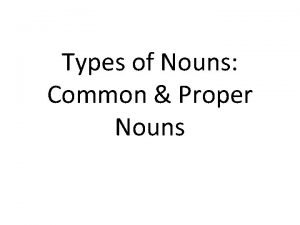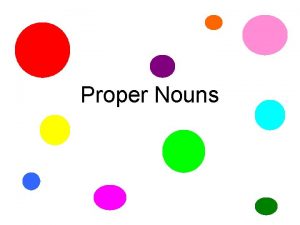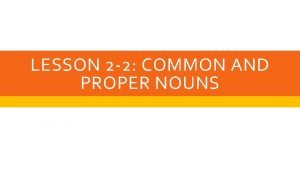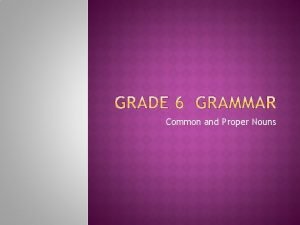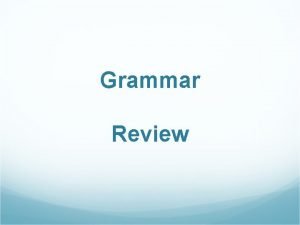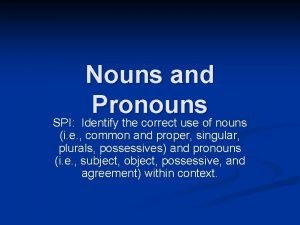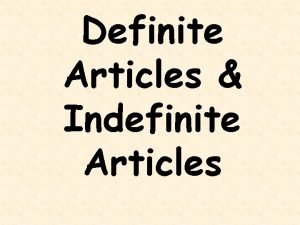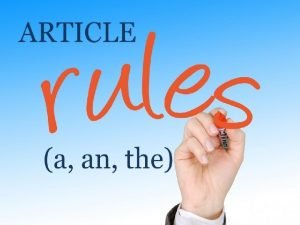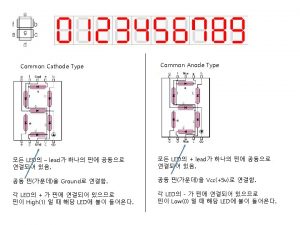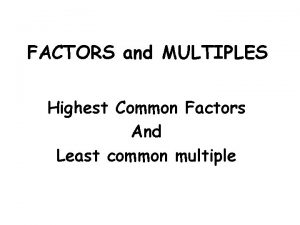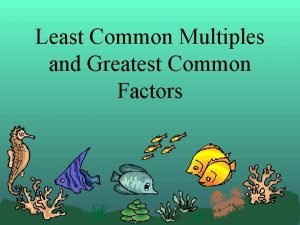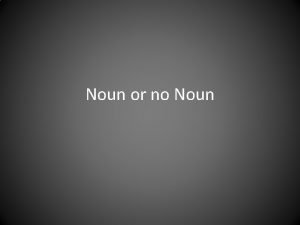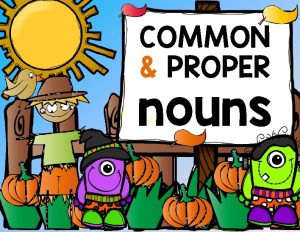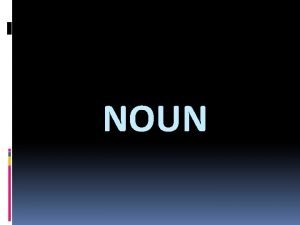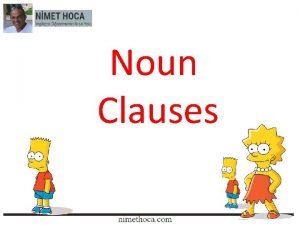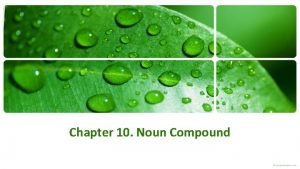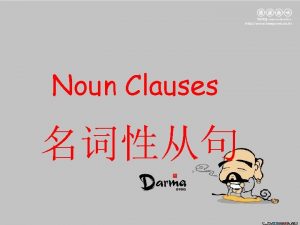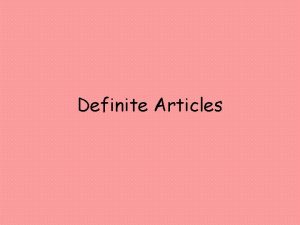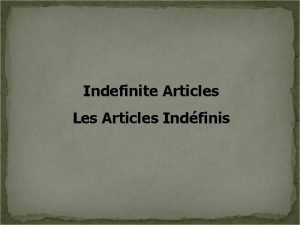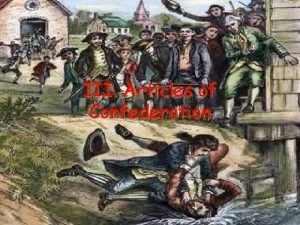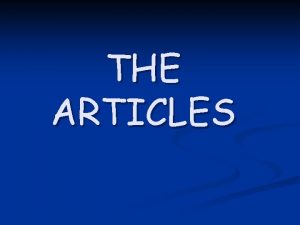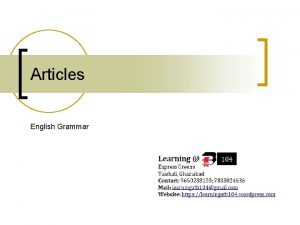Articles Use of Articles common noun or noun


















- Slides: 18

Articles

Use of Articles common noun or noun phrase Uncountable Countable Singular a/an (non-specific) the (specific) eg 1471/jc/dec 2008 Plural the (specific) Ø zero (Ø) (generic)

Articles n n Are used with certain categories of proper nouns Are used with common nouns or noun phrases Consist of the indefinite article (a/an) and the definite article (the) Are absent in non-specific cases and are indicated by the Ø (zero article) eg 1471/jc/dec 2008

Rules for Using Articles n These categories of proper nouns do not require “the” Categories People’s names Cities and states Singular names of countries Months/days Streets Religious buildings Mountains Parks Lakes eg 1471/jc/dec 2008 Examples John Locke Bangkok, Negri Sembilan Indonesia, Australia May, Tuesday Pickering Street, Holland Road St. Andrew’s Cathedral Mount Fuji Hyde Park Lake Victoria

Rules for Using Articles n The proper nouns below require “the”. Categories Museums and galleries Buildings Highways Seas and oceans Rivers and deserts Periods and events in history Bridges Countries with United, Union, Kingdom, Republic Island groups ending in (e)s eg 1471/jc/dec 2008 Examples the Asian Civilization Museum the University Cultural Centre the Pan-Island Expressway the South China Sea the Mississippi, the Gobi desert the Dark Ages the Manhattan Bridge the United States, the People’s Republic of China the Philippines

Rules for Using Articles n Depend on generic or specific reference Comment on the use of the articles in the sentences below. A paper on global warming was presented at a conference. The paper on global warming was presented at the conference. eg 1471/jc/dec 2008

Specific Reference n Is recognizable by both the writer and the reader through shared knowledge. The sun rises in the east. (Fact) The lab report should be submitted today. (Both the writer and the reader know which lab report is being referred to. ) eg 1471/jc/dec 2008

Specific Reference n Is used after a general reference is made. EG 1471 students are required to write an essay in the semester. The essay will be revised a few times. eg 1471/jc/dec 2008

Specific Reference n Is used when the noun has been modified by an adjectival phrase or clause. The portfolios that students have to prepare consist of different assignments. eg 1471/jc/dec 2008

Nonspecific and Generic References n Happen when neither the writer nor the reader identify the noun as something known, unique or familiar. Ø University students receive Ø tuition grants for their studies. eg 1471/jc/dec 2008

Nonspecific and Generic Reference n Use a/an with a singular countable noun that is non-specific. An engineering textbook was left at the counter. A lecturer gave the freshmen an overview of the course. eg 1471/jc/dec 2008

Use of A and An n Depends on eg 1471/jc/dec 2008

Nonspecific and Generic Reference n Do not use an article when a plural countable noun is non-specific. Ø Graduates are held in high esteem by Ø employers. eg 1471/jc/dec 2008

Nonspecific and Generic Reference n Do not use an article when an uncountable noun is non-specific. The internet is a rich resource of Ø information. eg 1471/jc/dec 2008

Nonspecific and Generic Reference n Do not use an article when a generalization is made about an uncountable noun. Ø Water is scarce in many countries. Ø Oil is a finite resource. eg 1471/jc/dec 2008

Abstract Generic vs. Concrete Generic Abstract Generic: The Entire Class Concrete Generic: A Representative Class The wasp can detect unique volatile compounds over great distances. A wasp can be trained to detect odors. The laser has many uses in medicine. A laser can be used by a surgeon to make very clean cuts. The computer has been invaluable in scientific advancement. Computers are playing a growing role in all aspects of university life Source: Swales & Feak (2009), 299. eg 1471/jc/dec 2008

Superlatives, Ordinals and Sole References n The definite article “the” is always used with the above categories. Mount Everest is the highest mountain in the world. (superlative) Statistics is the second most difficult subject. (ordinal) The main (only/sole/chief) reason I do engineering is to contribute to mankind. (sole reference) eg 1471/jc/dec 2008

Sources Lane, A. and Lange, E. (1999). Writing Clearly: An Editing Guide (2 nd ed. ). Boston: Heinle and Heinle Publishers, 198 -209. Raimes, A. (2006). Grammar Troublespots: A Guide for Student Writers (3 rd ed. ). New York: Cambridge University Press, 98 -105. Swales, J. M. and Feak, C. B. (2009). Academic Writing for Graduate Students: Essential Tasks and Skills (2 nd ed. ). USA: The University of Michigan Press, 289 -301. eg 1471/jc/dec 2008
 Collective noun beginning with b
Collective noun beginning with b Common noun vs proper noun
Common noun vs proper noun Proper nouns name
Proper nouns name Noun and proper noun
Noun and proper noun Count nouns and proper nouns
Count nouns and proper nouns Nouns project
Nouns project Compound nouns kitchen
Compound nouns kitchen Common noun meaning
Common noun meaning Norminal clause
Norminal clause Common and proper nouns powerpoint
Common and proper nouns powerpoint Kinds of articles
Kinds of articles Libros definite article
Libros definite article Is what an article
Is what an article Common factors of 60 36 and 48
Common factors of 60 36 and 48 Common anode and common cathode
Common anode and common cathode Common factors and common multiples
Common factors and common multiples How to find lowest common factor
How to find lowest common factor Factors of 42
Factors of 42 Multiples of 9 and 21
Multiples of 9 and 21

